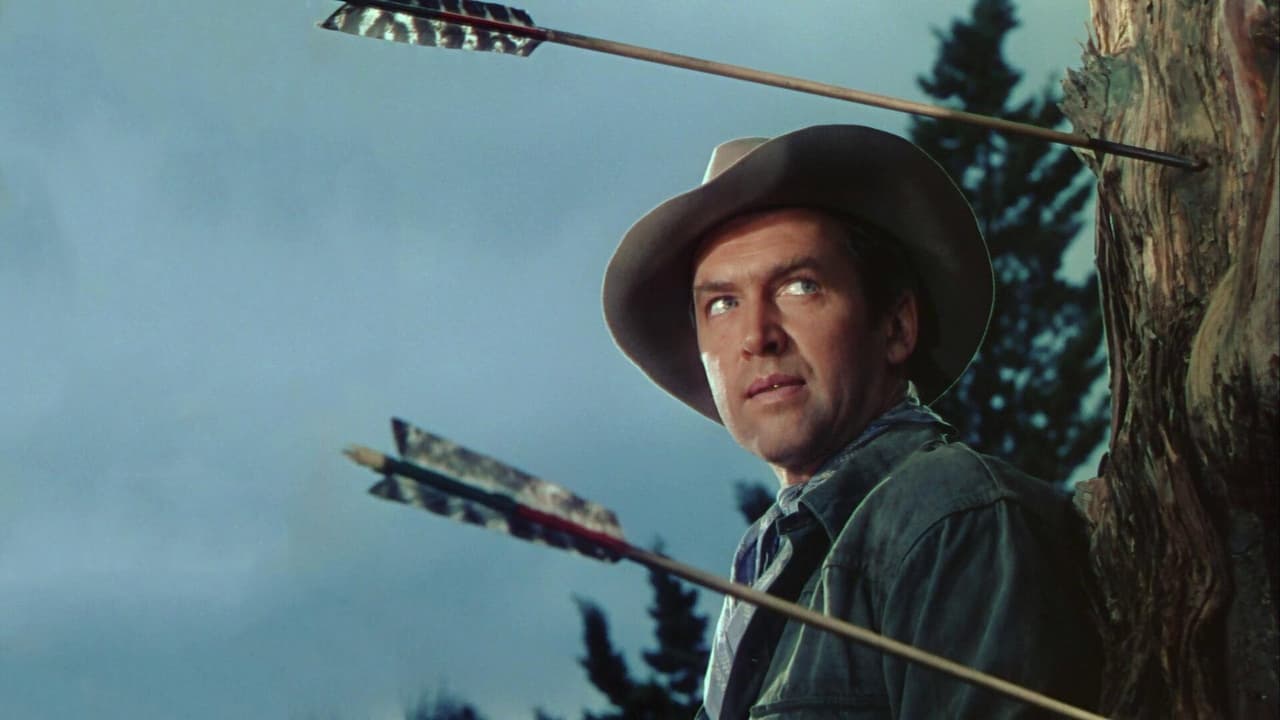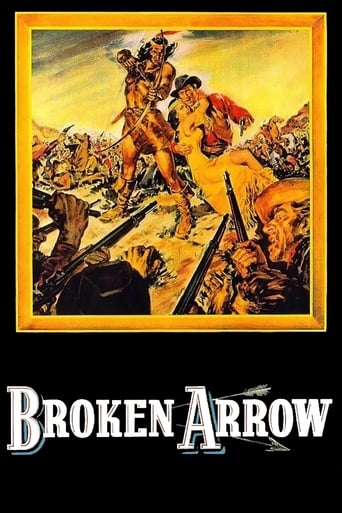

Sadly Over-hyped
... View MoreJust so...so bad
... View MoreAmateur movie with Big budget
... View MoreIt's a feast for the eyes. But what really makes this dramedy work is the acting.
... View MoreAlthough generally regarded as a trail-blazer in treating Indians sympathetically, "Broken Arrow" was far from the first. That honor belongs to Kit Carson (1903). Similar sympathetic studies include Pioneer Days (1907), The Call of the Wild (1908), The Justice of the Redskin (1908), The Redman and the Child (1908), The Red Man (1909), A Red Man's Love (1909), The Redman's View (1909).We could continue, year by year, but it is sufficient to say that "Broken Arrow" was the 411th Hollywood film to depict Indians as major screen characters. It's not even true to state that before "Broken Arrow" most westerns treated Indians unsympathetically. A minority did regard Indians solely as bloodthirsty savages, but I stress these films were in the minority. They were, however, much more influential than their representation because they were generally big-budget attractions like Red River (1948), Unconquered (1947), They Died With Boots On (1942), Kit Carson (1940), Northwest Passage (1940), Geronimo (1940), Drums Along the Mohawk (1939), Union Pacific (1939), Stagecoach (1939), Allegheny Uprising (1939), Wells Fargo (1937), The Plainsman (1936). What we can say is that "Broken Arrow" was the first of the postwar "A" westerns to cast Indians in a more tolerant and understanding light, to present them as emotional human beings with cultural and religious identities. As such, the movie stands up remarkably well. Of course we are still burdened by the twin conventions of white actors impersonating Indians and all speaking beautiful English (though James Stewart's off-camera commentary at least makes an attempt to explain this latter problem away). All the same, Chandler does bring a charisma and a dignity to his role, whilst Debra Paget — forsaking all her usual mannerisms — is astonishingly convincing. Stewart of course is his usual capable self. And he is backed up by a solid support cast. "Broken Arrow" is less sentimental and has far more action than I remembered. Both action and dialogue scenes are staged with great competence by Delmer Daves. When all's said and done though, it's the marvelous locations, superbly captured in great Technicolor images, that stay in the memory.
... View More'Broken Arrow' was one of the first Westerns I ever watched. When I saw it, I didn't know who James Stewart was - and now he stands as one of my favourite actors. Every now and then I post a response to an IMDb thread asking readers which Westerns are their favourites, and 'Broken Arrow' sometimes makes an appearance in my list - a list which mostly consists of much bigger, more expensive and aspirational titles like 'The Searchers' and 'For a Few Dollars More'. What I like about Delmer Daves' comparatively modest Western is its spirit. 'Broken Arrow' appears to be a product of good intentions and intelligent reflection on the Western genre, especially concerning its generally unfavourable portrayal of Native Americans. 'Broken Arrow' wasn't the only Western to do this - 'Apache' did it, as did 'Fort Apache' towards the end. Delmer Daves' film delivers the message most effectively, though, and I attribute this in part to both the strong writing and the effective performances of James Stewart and Jeff Chandler. The Western has come a long way in its extensive history, and films like 'Broken Arrow' are of understated importance in shaping and improving it.
... View More...but this was a very fine Western, and I don't even like the Western genre particularly well.James Stewart plays Tom Jeffords, an ex-army soldier, scout, and now someone who is panning for gold in Apache country. He comes across a wounded Apache child and heals him, but he doesn't leave Apache country before he comes upon a war party. When they learn he isn't somebody who takes Apache scalps and that he helped one of their own, they let him go but warn him not to return. This teaches him that the Apache can play fair. He decides to learn their ways and language from an Apache in town, and sets out on the dangerous mission to meet Cochise, leader of the Apaches, and to try to slowly build peace between the Apache and the Americans, who are trying to settle Arizona after the Civil War - that is if he survives his first encounter with an Apache scouting party, who just might kill him for the sake of the Apache and Americans being at war.I don't know how accurate this film is historically, but there is some fine acting, action, suspense, and even a touching Anglo-Apache romance. Although the idea of Jeff Chandler as Cochise, who usually played beefcake roles over at Universal, seemed somewhat laughable to me at first, his performance rings true. So true, in fact, there was a kind of sequel where Chandler again played Cochise and Jay Silverheels again played Geronimo.Maybe this film had Jeffords as a kind of "loyal American loner" to speak to issues larger than just that of the history of which this film deals. As a loner Jeffords could see the problem more objectively than somebody with a large extended family and network of friends that could influence him against the reasoning of his own mind. With the Cold War in full swing and the civil rights era just beginning in America at the time it was made, maybe this film was trying to speak for the equality of all people and against the mentality of the mob. I think that's why so many Westerns were made in the 50's and 60's. There was the interesting story on the surface, but there was also the dealing with tricky social issues just under that surface that society wasn't quite ready to face in a direct manner yet.
... View MoreAs the war rages between the American settlers and the Apache, former soldier Tom Jeffords happens upon a young Indian wounded after an attack. Taking upon himself to aid the boy, it's not long before the Apache show up intent on killing Jeffords by way of the war instincts. Pleading for Jeffords' life, the boy manages to get him spared by the Apache chief, Cochise. It's the start of a friendship that may just bring and end to the war and peace across the west.Tho not the first "social" Western film made, Broken Arrow, it can be argued, is maybe one of the most important and telling genre films of the 50s. Showing humanist portrayals of the Apache and dealing out level headed tellings of the relationships between whites and the Native Americans, Delmer Daves' film is as relevant today as it was back on release. Adapted from Elliott Arnold's novel Blood Brother, the story follows Jeffords (a measured and fine James Stewart) as he attempts to broker peace between the warring factions. Firstly by convincing Cochise (Jeff Chandler bang on form) to allow the mail run thru the pass, something that brings suspicion and calls of Indian lover from Jeffords' own kind, and then to finally set up a peace pact at a time when violence and hatred was rife in the west.As the friendship between the two men grows, Jeffords and an Apache girl fall in love (beautiful Debra Paget as Sonseeahray), thus giving the story a further jolt of momentum. The screenplay then really hits its stride, as Daves and his crew pit peace and inter racial love against a backdrop of bloodshed and savagery. Never glossing over just how hard peace is going to be, Broken Arrow retains intelligence and a sensitivity even as breakaway factions from both sides (for example we see Geronimo split the Apache and form a renegade front) are intent on killing off the peace process. It even has time for deep emotional kickers to reinforce the point of just how tough and unlikely peace and tolerance can be sometimes.Broken Arrow was, and still is, a bold picture. In fact it can be argued that for the likes of Daves and Stewart, it was at the time very bold and risky career moves. But it paid off because the film stands up today as a picture of some distinction. It's themes and approach to its subjects are something that this generation, and all the future ones, will always find to be socially important. Boosted by Hugo Friedhofer's luscious score and taking advantage of the Lone Pine location shoot, Broken Arrow is a fine fine film that even non Western fans should be looking to absorb. 8/10
... View More